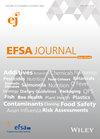Scientific Opinion on the safety and efficacy of vitamin A (retinyl acetate, retinyl palmitate and retinyl propionate) as a feed additive for all animal species and categories
Abstract
Vitamin A is essential for vision, growth differentiation and proliferation of a wide range of epithelial tissues, bone growth, reproduction and embryonic development. The tolerance data for the target species do not indicate a concern for animal safety considering the maximum values set in the European Union regulation for food producing animals and pets. All consumer exposure calculations demonstrated that liver is the only food of animal origin for which consumption poses a risk to adult consumers. This risk could be considerably reduced, but not eliminated, if the new levels proposed by EFSA for a reduction in the maximum vitamin A content of feedingstuffs were respected. The proposal for a maximum content of vitamin A in complete feed or milk replacers or a maximum daily intake for the target species and categories of target species is presented in this opinion. However, the Panel on Additives and Products or Substances used in Animal Feed (FEEDAP) notes that the availability of an additional route of administration of vitamin A (e.g. water for drinking) would increase the risk for the consumer. Retinyl esters are irritants to skin and potential skin sensitisers. Data on respiratory toxicity and the levels of exposure of workers that would cause systemic or respiratory toxicity are not available. However, it is likely that workers will be exposed to inhalation by handling certain formulations. The use of vitamin A in animal nutrition up to the maximum contents authorised does not pose a risk to the environment. Retinyl esters are regarded as effective sources of vitamin A.





